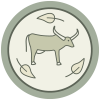
循环利用:加强循环利用意味着降低农业生产的经济和环境成本
浪费是一项人为提出的概念—在自然生态系统中并不存在浪费。生态农业方法通过模拟自然生态系统,支持推动在生产系统内进行养分、生物质和水分循环的生物过程,从而提高资源利用效率,并将浪费和污染降至最低。
循环利用可通过多样化并在不同组成部分与活动之间构建协同效应,在农场层面和景观范围内进行。比如,包括根系深植树木的农林复合系统能够捕获一年生作物根系无法吸收的养分。农牧系统通过利用粪便进行堆肥或直接施肥,并将作物残茬和副产品用作家畜饲料,推动了有机质的循环利用。养分循环占所有非供给性生态系统服务经济价值的51%,畜牧业的融入在其中发挥着主要作用。同样,在稻田养鱼系统中,水生动物协助对水稻作物施肥并减少有害生物,降低了对外部肥料或杀虫剂等投入品的需要。
循环利用通过闭合循环和减少浪费提供了多种惠益,降低了对外部资源的依赖,提升了生产者的自主能力,降低了面对市场和气候冲击时的脆弱性。循环利用有机质和副产品为生态农业创新提供了巨大潜力。
Database
Este documento, desde análisis históricos enmarcados en algunas teorías y desde el reconocimiento de la Agroecología como ciencia que debe asumir un rol mucho más protagónico en la definición de las futuras políticas de producción, pretende aportar elementos útiles para dicho debate. El mismo se estructura de la siguiente manera....
Paraguay
工作文件
2009
The magnitude and urgency of the challenges facing agriculture and food systems demand profound modifications in different aspects of human activity to achieve real transformative change and sustainability. Recognizing that the inherent complexity of achieving sustainability is commonly seen as a deterrent to decision-making, FAO has approved the 10 Elements...
杂志文章
2020
Agroecological symbiosis (AES) is a new, transformative model for adaptive and resilient localized food production and consumption. An AES is formed by farms, small and medium-scale food processors, and bioenergy producers working as one system, in close proximity to each other. The physical proximity is dictated by the ecological necessity...
Finland
创新
2018
This publication brings a summary of the main insights from the study of agroecology, which point out challenges and opportunities for the strengthening and dynamization of the agroecological transition in Brazil. This study wants researchers, scientists, farmers and activists to be able to take this mapping, expand it or develop new...
Brazil
报告
2023
